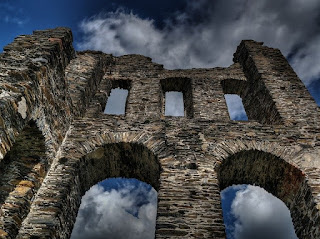I can’t help noticing that Hosea is not the only Old Testament prophet who declaimed against fortresses. You may remember he told his nation, “Because you have trusted in your own way and in the multitude of your warriors, therefore the tumult of war shall arise among your people, and all your fortresses shall be destroyed.”
So it happened, as we have been discovering in our Saturday studies in Hosea.
Fig Trees Shaken
In fact, you will search the scriptures in vain to find anything much positive said about fortresses generally — the literal ones at least. In Amos, we find the same theme: “The Lord is his name; who makes destruction flash forth against the strong, so that destruction comes upon the fortress.” Micah speaks of a future day in which God will “cut off the cities of your land and throw down all your strongholds”. Nahum writes, “All your fortresses are like fig trees with first-ripe figs — if shaken they fall into the mouth of the eater.” And Habakkuk says of the Chaldean army, “They laugh at every fortress, for they pile up earth and take it.”
That’s the thing about fortified cities: they provide the illusion of safety and protection, but anyone with a big enough army and sufficient patience will eventually pull even the most impressive stronghold to the ground. Both secular history and the scriptures attest to it repeatedly. It happened to Jericho, Nineveh, Tyre and Babylon. It happened to Samaria, and to Jerusalem over and over again.
Old Nick Weighs In
Why doesn’t God like fortresses? I think we find a hint of it in — of all the strange places — the writings of Niccolò Machiavelli. Machiavelli was a Renaissance philosopher and political commentator (among other things) who liked to distill from history the most efficient principles of governance and strategy. Like the prophets, Machiavelli thought fortresses largely useless and those who build them terminally short-sighted.
He writes:
“To the wise men of our day it may seem an oversight on the part of the Romans, that … it never occurred to them to build strongholds in their cities to be a curb upon them, and insure their fidelity. Doubtless, had those old Romans been like-minded with our modern sages, they would not have neglected to build themselves fortresses, but because they far surpassed them in courage, sense, and vigour, they refrained.”
He even thought fortresses dangerous to good government:
“Nothing can be more unserviceable than a fortress as a restraint upon your subjects, since it only makes you the readier to oppress them, and less scrupulous how you do so; while it is this very oppression which moves them to destroy you, and so kindles their hatred, that the fortress, which is the cause of all the mischief, is powerless to protect you. A wise and good prince, therefore, that he may continue good, and give no occasion or encouragement to his descendants to become evil, will never build a fortress.”
For Machiavelli, building fortresses was an obvious sign of bad character. And if the builder were not a bad actor, his children or grandchildren surely would be.
Unnecessary Walls
This was certainly the case in Israel, where a plethora of fortresses did nothing but inspire false confidence and encourage kings and princes to egregious misbehavior (see the reign of Ahab for further details). The fortified cities of Israel became home to the high places in which the people worshiped the gods of Canaan. The city dwellers of Ephraim felt they were untouchable. As Machiavelli observed, their ramparts provided a safe haven from which inept or callous rulers abused the people they were tasked with governing.
Interestingly, you do not find God commanding the building of fortresses. With God on your side, they were quite unnecessary. And if you didn’t have God, well, fortresses weren’t going to help you much; they just delayed the inevitable. So the patriarchs lived in tents. In Egypt, the Israelites lived in houses. It was only when Israel conquered Canaan that large numbers began to live in fortified cities, primarily because the fortresses were already standing. The Canaanites trusted in them. (Fat lot of good it did them.)
Think of that: Israel went from marching around Jericho and watching its walls fall to the ground by the power of God to depending on walls of the very same type to protect them.
A Bulwark Never Failing
The Christian’s refuge and fortress is God himself. Anything in our lives that gives us a false sense of protection becomes a rival to him. It will not profit us any more than the fortresses of the Canaanites profited the Israelites who lived in them. Worse, we may end up clinging to our security blankets even when they can do us no good. Thousands of people starved to death over the centuries behind fortified walls, Israelites among them.
Likewise, putting our faith in anything but Christ is a recipe for spiritual famine. Whether it’s the 401K, the pension plan, the equity in our houses, the good job, a loving wife and family, a history of excellent health — whatever it may be, we need to remember it can all vanish in a heartbeat.
In fact, the moment we come to trust in it, we pretty much ensure it will. The Lord would not have us put our confidence in anything less than him.

No comments :
Post a Comment